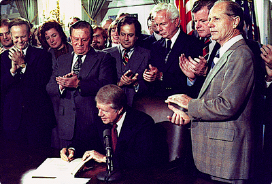I can’t imagine what it would be like to be president.
It’s probably the only job that, no matter what you do, you’re going to be hated.
I suppose it comes with the territory, and I’ve certainly never hidden my feelings about any sitting president since I started writing op-ed pieces back in high school, during the Reagan administration.
Typically those op-eds were little more than attacks on policies and rhetoric that were at odds with my own, very Libertarian mindset.
A healthy combination of free markets and social liberalism has long been “my way.” And I make no apologies for that. Which is why, I’d like to take a moment today to credit former President Jimmy Carter with a couple of policy moves he made that embraced deregulation. Something that seemed to have been eschewed by Democrats and ignored by Republicans.
The first was the Airline Deregulation Act of 1978, which Carter signed into law. This law instigated a new level of competition in the airline industry which ultimately resulted in more destinations, increased safety protocols, and a 20% reduction in fares, according to data from the Brookings Institution.
Carter also brought about the deregulation of the trucking industry.
As reported by Andrew Crain in the Journal on Telecommunication and High Tech Law, before deregulation, the Interstate Commerce Commission (ICC) was given jurisdiction over trucking companies and prevented competitive entry by rarely granting new trucking permits.
The development of efficient trucks should have been a great boon to shippers. …ICC regulations, however, prevented truckers from offering those benefits to consumers. Trucking companies were forced to travel set routes at set prices. …During his presidential campaign, Carter promised to pursue deregulation. …Carter was good to his word. In 1979, he appointed three deregulation proponents to the ICC, Darius B. Gaskins, Marcus Alexis and Thomas Trantum. …In July 1980, Carter signed the Motor Carrier Act, which lifted most restrictions on entry, on the goods truckers could carry, and on the routes they could travel. …Rates fell, and trucking companies multiplied.
I love this!
As with any president, there will always be criticisms of their tenures. And rightly so. Indeed, it is a great gift that we have the right to criticize our elected leaders without fear of persecution.
But equally, we should not be afraid to speak out about their proper accomplishments as well. And when it comes to Jimmy Carter, his efforts to combat regulatory regimes that penalized consumers and hindered economic growth should not only be noted, but praised.
Phil Gramm and Mike Solon of the Wall Street Journal opined on Carter’s deregulation efforts, writing …
Far from hurting consumers, as progressive myth alleges, deregulation of the U.S. transportation system unleashed a wave of invention and innovation that reduced logistical transportation cost—the cost of moving goods as a percentage of gross domestic product—by an astonishing 50% over 40 years. Airline fares were cut in half on a per mile basis, while air cargo surged from 5.4% of all shipments to 14.5% by 2012.
In this Carter-led reform, the duty of government was to protect the consumer from harm, not to protect the producer from competition. Without the productive energy released by deregulating airlines, trucking, railroads…, the U.S. might not have found its competitive legs as its postwar dominance in manufacturing ended in the late 1970s. The benefits of deregulation to this day continue to make possible powerful innovations that remake the world.
In the coming days and weeks, many people will honor the legacy of President Carter. I suspect mostly because of all the important work he did after leaving office. Particularly his work with Habitat for Humanity, where he and his wife worked with other volunteers to build more than 4,330 homes in 14 different countries over the past 38 years. An honorable endeavor to be sure.
But when conversation comes up about Jimmy Carter – and it will – be sure to remind folks that not only was Jimmy Carter a righteous man for all the volunteer work he did for nearly four decades, but he was also a righteous man for having the courage to battle those who chose to embrace excessive government control at the expense of consumers and taxpayers.

President Jimmy Carter signing the Airline Deregulation Act into Law



